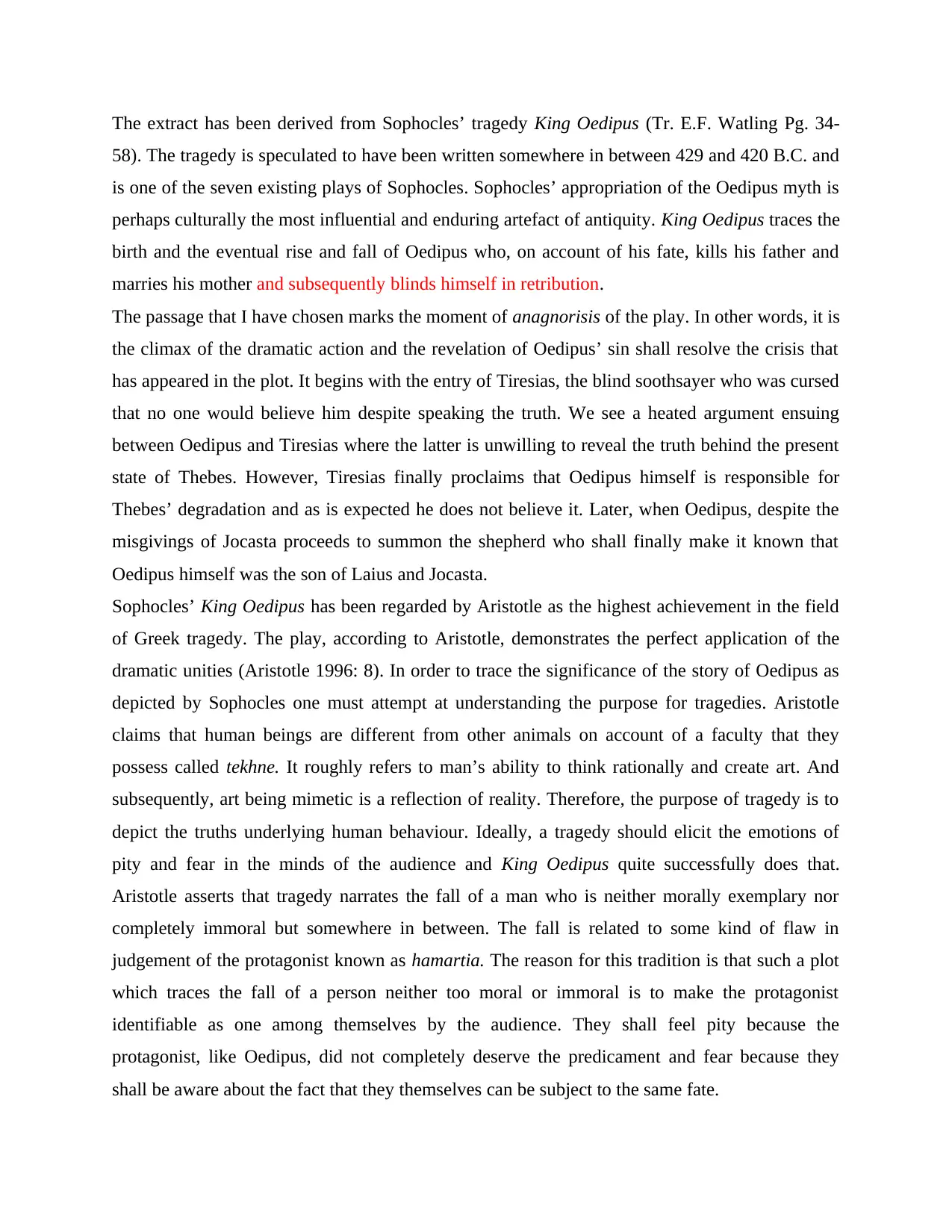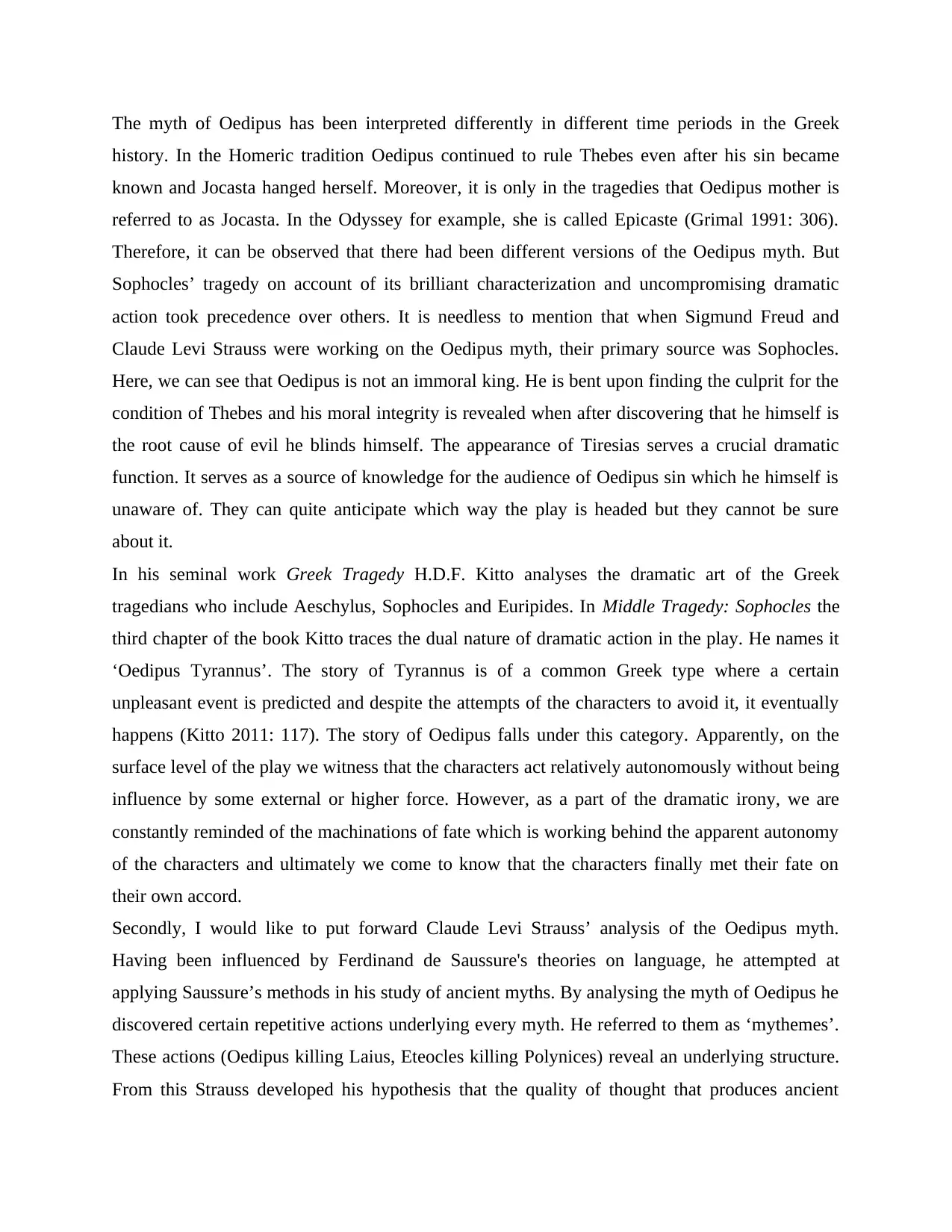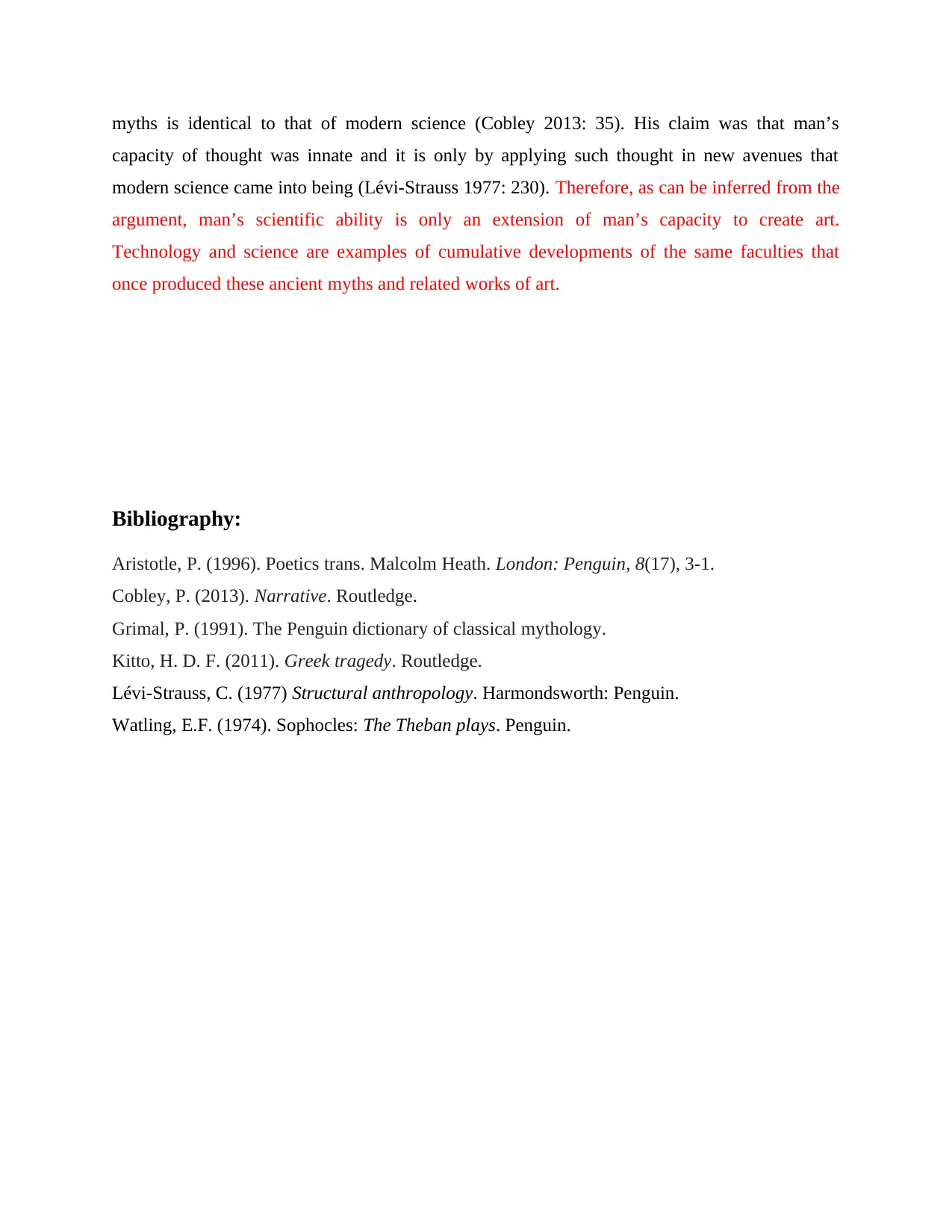A Study of Sophocles’ King Oedipus
VerifiedAdded on 2023/06/07
|4
|1233
|490
AI Summary
The article provides an analysis of Sophocles’ King Oedipus, its significance, and interpretation. It explains the purpose of tragedy and the myth of Oedipus. The article also includes the views of Aristotle, H.D.F. Kitto, and Claude Levi Strauss on the play.
Contribute Materials
Your contribution can guide someone’s learning journey. Share your
documents today.

A Study of Sophocles’ King Oedipus
Secure Best Marks with AI Grader
Need help grading? Try our AI Grader for instant feedback on your assignments.

The extract has been derived from Sophocles’ tragedy King Oedipus (Tr. E.F. Watling Pg. 34-
58). The tragedy is speculated to have been written somewhere in between 429 and 420 B.C. and
is one of the seven existing plays of Sophocles. Sophocles’ appropriation of the Oedipus myth is
perhaps culturally the most influential and enduring artefact of antiquity. King Oedipus traces the
birth and the eventual rise and fall of Oedipus who, on account of his fate, kills his father and
marries his mother and subsequently blinds himself in retribution.
The passage that I have chosen marks the moment of anagnorisis of the play. In other words, it is
the climax of the dramatic action and the revelation of Oedipus’ sin shall resolve the crisis that
has appeared in the plot. It begins with the entry of Tiresias, the blind soothsayer who was cursed
that no one would believe him despite speaking the truth. We see a heated argument ensuing
between Oedipus and Tiresias where the latter is unwilling to reveal the truth behind the present
state of Thebes. However, Tiresias finally proclaims that Oedipus himself is responsible for
Thebes’ degradation and as is expected he does not believe it. Later, when Oedipus, despite the
misgivings of Jocasta proceeds to summon the shepherd who shall finally make it known that
Oedipus himself was the son of Laius and Jocasta.
Sophocles’ King Oedipus has been regarded by Aristotle as the highest achievement in the field
of Greek tragedy. The play, according to Aristotle, demonstrates the perfect application of the
dramatic unities (Aristotle 1996: 8). In order to trace the significance of the story of Oedipus as
depicted by Sophocles one must attempt at understanding the purpose for tragedies. Aristotle
claims that human beings are different from other animals on account of a faculty that they
possess called tekhne. It roughly refers to man’s ability to think rationally and create art. And
subsequently, art being mimetic is a reflection of reality. Therefore, the purpose of tragedy is to
depict the truths underlying human behaviour. Ideally, a tragedy should elicit the emotions of
pity and fear in the minds of the audience and King Oedipus quite successfully does that.
Aristotle asserts that tragedy narrates the fall of a man who is neither morally exemplary nor
completely immoral but somewhere in between. The fall is related to some kind of flaw in
judgement of the protagonist known as hamartia. The reason for this tradition is that such a plot
which traces the fall of a person neither too moral or immoral is to make the protagonist
identifiable as one among themselves by the audience. They shall feel pity because the
protagonist, like Oedipus, did not completely deserve the predicament and fear because they
shall be aware about the fact that they themselves can be subject to the same fate.
58). The tragedy is speculated to have been written somewhere in between 429 and 420 B.C. and
is one of the seven existing plays of Sophocles. Sophocles’ appropriation of the Oedipus myth is
perhaps culturally the most influential and enduring artefact of antiquity. King Oedipus traces the
birth and the eventual rise and fall of Oedipus who, on account of his fate, kills his father and
marries his mother and subsequently blinds himself in retribution.
The passage that I have chosen marks the moment of anagnorisis of the play. In other words, it is
the climax of the dramatic action and the revelation of Oedipus’ sin shall resolve the crisis that
has appeared in the plot. It begins with the entry of Tiresias, the blind soothsayer who was cursed
that no one would believe him despite speaking the truth. We see a heated argument ensuing
between Oedipus and Tiresias where the latter is unwilling to reveal the truth behind the present
state of Thebes. However, Tiresias finally proclaims that Oedipus himself is responsible for
Thebes’ degradation and as is expected he does not believe it. Later, when Oedipus, despite the
misgivings of Jocasta proceeds to summon the shepherd who shall finally make it known that
Oedipus himself was the son of Laius and Jocasta.
Sophocles’ King Oedipus has been regarded by Aristotle as the highest achievement in the field
of Greek tragedy. The play, according to Aristotle, demonstrates the perfect application of the
dramatic unities (Aristotle 1996: 8). In order to trace the significance of the story of Oedipus as
depicted by Sophocles one must attempt at understanding the purpose for tragedies. Aristotle
claims that human beings are different from other animals on account of a faculty that they
possess called tekhne. It roughly refers to man’s ability to think rationally and create art. And
subsequently, art being mimetic is a reflection of reality. Therefore, the purpose of tragedy is to
depict the truths underlying human behaviour. Ideally, a tragedy should elicit the emotions of
pity and fear in the minds of the audience and King Oedipus quite successfully does that.
Aristotle asserts that tragedy narrates the fall of a man who is neither morally exemplary nor
completely immoral but somewhere in between. The fall is related to some kind of flaw in
judgement of the protagonist known as hamartia. The reason for this tradition is that such a plot
which traces the fall of a person neither too moral or immoral is to make the protagonist
identifiable as one among themselves by the audience. They shall feel pity because the
protagonist, like Oedipus, did not completely deserve the predicament and fear because they
shall be aware about the fact that they themselves can be subject to the same fate.

The myth of Oedipus has been interpreted differently in different time periods in the Greek
history. In the Homeric tradition Oedipus continued to rule Thebes even after his sin became
known and Jocasta hanged herself. Moreover, it is only in the tragedies that Oedipus mother is
referred to as Jocasta. In the Odyssey for example, she is called Epicaste (Grimal 1991: 306).
Therefore, it can be observed that there had been different versions of the Oedipus myth. But
Sophocles’ tragedy on account of its brilliant characterization and uncompromising dramatic
action took precedence over others. It is needless to mention that when Sigmund Freud and
Claude Levi Strauss were working on the Oedipus myth, their primary source was Sophocles.
Here, we can see that Oedipus is not an immoral king. He is bent upon finding the culprit for the
condition of Thebes and his moral integrity is revealed when after discovering that he himself is
the root cause of evil he blinds himself. The appearance of Tiresias serves a crucial dramatic
function. It serves as a source of knowledge for the audience of Oedipus sin which he himself is
unaware of. They can quite anticipate which way the play is headed but they cannot be sure
about it.
In his seminal work Greek Tragedy H.D.F. Kitto analyses the dramatic art of the Greek
tragedians who include Aeschylus, Sophocles and Euripides. In Middle Tragedy: Sophocles the
third chapter of the book Kitto traces the dual nature of dramatic action in the play. He names it
‘Oedipus Tyrannus’. The story of Tyrannus is of a common Greek type where a certain
unpleasant event is predicted and despite the attempts of the characters to avoid it, it eventually
happens (Kitto 2011: 117). The story of Oedipus falls under this category. Apparently, on the
surface level of the play we witness that the characters act relatively autonomously without being
influence by some external or higher force. However, as a part of the dramatic irony, we are
constantly reminded of the machinations of fate which is working behind the apparent autonomy
of the characters and ultimately we come to know that the characters finally met their fate on
their own accord.
Secondly, I would like to put forward Claude Levi Strauss’ analysis of the Oedipus myth.
Having been influenced by Ferdinand de Saussure's theories on language, he attempted at
applying Saussure’s methods in his study of ancient myths. By analysing the myth of Oedipus he
discovered certain repetitive actions underlying every myth. He referred to them as ‘mythemes’.
These actions (Oedipus killing Laius, Eteocles killing Polynices) reveal an underlying structure.
From this Strauss developed his hypothesis that the quality of thought that produces ancient
history. In the Homeric tradition Oedipus continued to rule Thebes even after his sin became
known and Jocasta hanged herself. Moreover, it is only in the tragedies that Oedipus mother is
referred to as Jocasta. In the Odyssey for example, she is called Epicaste (Grimal 1991: 306).
Therefore, it can be observed that there had been different versions of the Oedipus myth. But
Sophocles’ tragedy on account of its brilliant characterization and uncompromising dramatic
action took precedence over others. It is needless to mention that when Sigmund Freud and
Claude Levi Strauss were working on the Oedipus myth, their primary source was Sophocles.
Here, we can see that Oedipus is not an immoral king. He is bent upon finding the culprit for the
condition of Thebes and his moral integrity is revealed when after discovering that he himself is
the root cause of evil he blinds himself. The appearance of Tiresias serves a crucial dramatic
function. It serves as a source of knowledge for the audience of Oedipus sin which he himself is
unaware of. They can quite anticipate which way the play is headed but they cannot be sure
about it.
In his seminal work Greek Tragedy H.D.F. Kitto analyses the dramatic art of the Greek
tragedians who include Aeschylus, Sophocles and Euripides. In Middle Tragedy: Sophocles the
third chapter of the book Kitto traces the dual nature of dramatic action in the play. He names it
‘Oedipus Tyrannus’. The story of Tyrannus is of a common Greek type where a certain
unpleasant event is predicted and despite the attempts of the characters to avoid it, it eventually
happens (Kitto 2011: 117). The story of Oedipus falls under this category. Apparently, on the
surface level of the play we witness that the characters act relatively autonomously without being
influence by some external or higher force. However, as a part of the dramatic irony, we are
constantly reminded of the machinations of fate which is working behind the apparent autonomy
of the characters and ultimately we come to know that the characters finally met their fate on
their own accord.
Secondly, I would like to put forward Claude Levi Strauss’ analysis of the Oedipus myth.
Having been influenced by Ferdinand de Saussure's theories on language, he attempted at
applying Saussure’s methods in his study of ancient myths. By analysing the myth of Oedipus he
discovered certain repetitive actions underlying every myth. He referred to them as ‘mythemes’.
These actions (Oedipus killing Laius, Eteocles killing Polynices) reveal an underlying structure.
From this Strauss developed his hypothesis that the quality of thought that produces ancient

myths is identical to that of modern science (Cobley 2013: 35). His claim was that man’s
capacity of thought was innate and it is only by applying such thought in new avenues that
modern science came into being (Lévi-Strauss 1977: 230). Therefore, as can be inferred from the
argument, man’s scientific ability is only an extension of man’s capacity to create art.
Technology and science are examples of cumulative developments of the same faculties that
once produced these ancient myths and related works of art.
Bibliography:
Aristotle, P. (1996). Poetics trans. Malcolm Heath. London: Penguin, 8(17), 3-1.
Cobley, P. (2013). Narrative. Routledge.
Grimal, P. (1991). The Penguin dictionary of classical mythology.
Kitto, H. D. F. (2011). Greek tragedy. Routledge.
Lévi-Strauss, C. (1977) Structural anthropology. Harmondsworth: Penguin.
Watling, E.F. (1974). Sophocles: The Theban plays. Penguin.
capacity of thought was innate and it is only by applying such thought in new avenues that
modern science came into being (Lévi-Strauss 1977: 230). Therefore, as can be inferred from the
argument, man’s scientific ability is only an extension of man’s capacity to create art.
Technology and science are examples of cumulative developments of the same faculties that
once produced these ancient myths and related works of art.
Bibliography:
Aristotle, P. (1996). Poetics trans. Malcolm Heath. London: Penguin, 8(17), 3-1.
Cobley, P. (2013). Narrative. Routledge.
Grimal, P. (1991). The Penguin dictionary of classical mythology.
Kitto, H. D. F. (2011). Greek tragedy. Routledge.
Lévi-Strauss, C. (1977) Structural anthropology. Harmondsworth: Penguin.
Watling, E.F. (1974). Sophocles: The Theban plays. Penguin.
1 out of 4
Related Documents
Your All-in-One AI-Powered Toolkit for Academic Success.
+13062052269
info@desklib.com
Available 24*7 on WhatsApp / Email
![[object Object]](/_next/static/media/star-bottom.7253800d.svg)
Unlock your academic potential
© 2024 | Zucol Services PVT LTD | All rights reserved.
